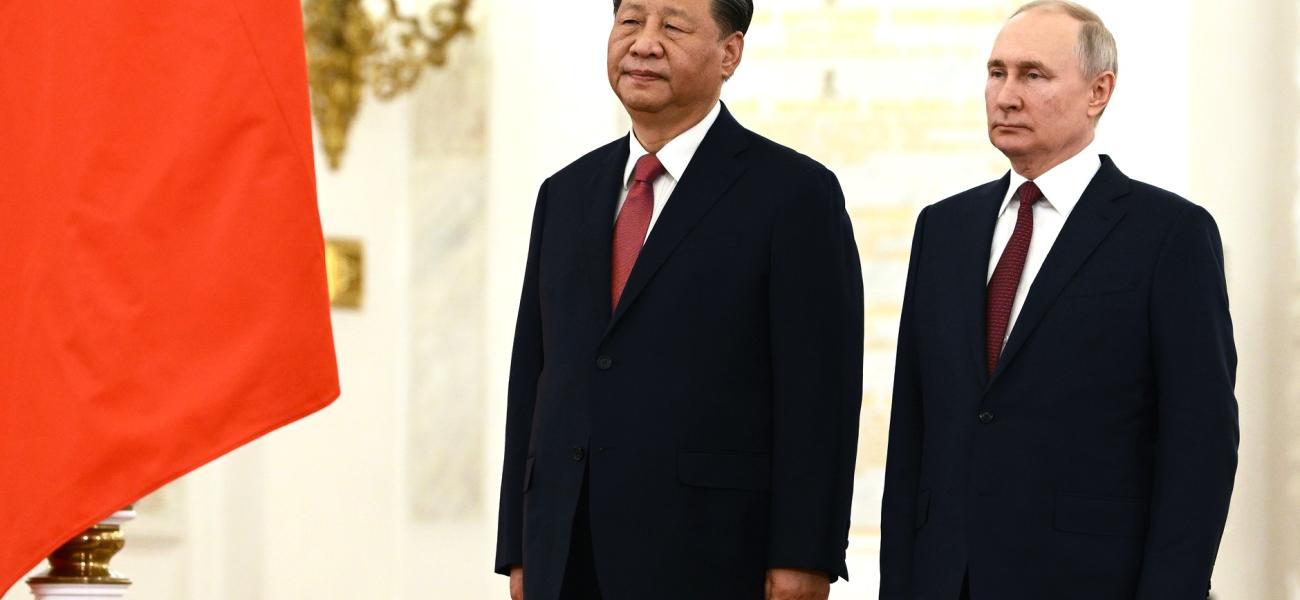
Putin and Xi’s Unholy Alliance.
April 09, 2024
Alexander Gabuev
This is a summary of an article originally published by Foreign Affairs under the title "Putin and Xi’s Unholy Alliance."
The author writes:
- Despite Beijing’s initially cautious approach, most available data points to a much more robust relationship between China and Russia developing in the two years since the invasion. In 2022, bilateral trade grew by 36 percent to $190 billion. In 2023, it grew to $240 billion, surpassing the $200 billion mark in November, a goal that Xi and Putin initially intended to reach in 2025 ... sales of Chinese industrial equipment jumped by 54 percent in 2023 compared with the previous year. ... Hidden in these figures are Chinese-made items that directly boost the Russian military machine, including growing exports of chips, optics, drones, and sophisticated manufacturing tools.
- China and Russia have grown notably closer in the critical area of security and military cooperation.
- That closeness is reflected in diplomacy as well.
- Connections to China are becoming increasingly important for Russian elites in crafting futures for themselves and their offspring.
- The overall warming of attitudes to China is reflected in opinion polls. At the end of 2023, 85 percent of Russians viewed China positively, whereas only six percent had a negative opinion of the country.
- Following the full-scale invasion of Ukraine in 2022, war has become the organizing principle of Russian domestic, economic, and foreign policy. The Kremlin now assesses every relationship with a foreign power through a lens of three essential considerations: whether this relationship can help Russia directly on the battlefield in Ukraine, whether it can help sustain the Russian economy and circumvent sanctions, and whether it can help Moscow push back against the West and punish the United States and its allies for supporting Kyiv. Russia’s relationship with China emphatically checks all three boxes.
- Russia is now locking itself into vassalage to China. A couple of years down the road, Beijing will be more able to dictate the terms of economic, technological, and regional cooperation with Moscow. The Kremlin is not blind to that prospect, but it does not have much choice as long as Putin needs Chinese support to fight his war in Ukraine, which has become an obsession.
- For its part, China has also come to see Russia as part of a fundamental geopolitical realignment. ... Following Putin’s invasion of Ukraine, Beijing made sure to ascertain the United States’ redlines and largely tried to adhere to them. But as Xi discovered in October 2022 after Biden authorized far-reaching U.S. export controls targeting China, such a cautious approach will not stop Washington from trying to constrain Beijing. ... No other power can bring as much to China’s table as Russia, particularly right now.
- Moscow and Beijing may never sign a formal alliance, but the evolution of their relationship in the years ahead will increasingly affect the world and challenge the West. To come to terms with this development, Western policymakers should abandon the idea that they can drive a wedge between Beijing and Moscow. Under Trump, the National Security Council entertained the idea of a “reverse Kissinger” approach of engaging Russia, the weaker partner, but to no avail. Whereas former Secretary of State Henry Kissinger courted communist China during the Cold War by offering Beijing a normalization of ties with the United States, U.S. officials cannot extend a deal of that sort to either Moscow or Beijing at this point.
- If the China-Russia tandem is here to stay, Western leaders must build a long-term strategy that will help maintain peace by accounting for all the ramifications of having to compete with China and Russia simultaneously. ... When considering how to protect European and Asian security, rein in climate change, govern new disruptive technologies such as artificial intelligence, and address the challenges facing global financial architecture, Western policymakers must now reckon with the reality of an increasingly resolute Sino-Russian axis.
Read the full article on the Foreign Affairs website.
Author
Alexander Gabuev
Alexander Gabuev is the Director of the Carnegie Russia Eurasia Center in Berlin.
The opinions expressed herein are solely those of the author. Photo by the Kremlin shared under a public licence.
Stay up to date!
Never miss a Russia Matters exclusive! By signing up for our media advisory, you'll be notified when new exclusives are published.
Sign up here!
Recent Analysis
CIA Director Burns on Ukraine: ‘We’re Running Out of Time to Help Them’
April 25, 2024
George W. Bush Presidential Center
Personnel Stagnation to Splinter Putin Elite With Battle of Lost Generations
April 19, 2024
Andrey Pertsev

